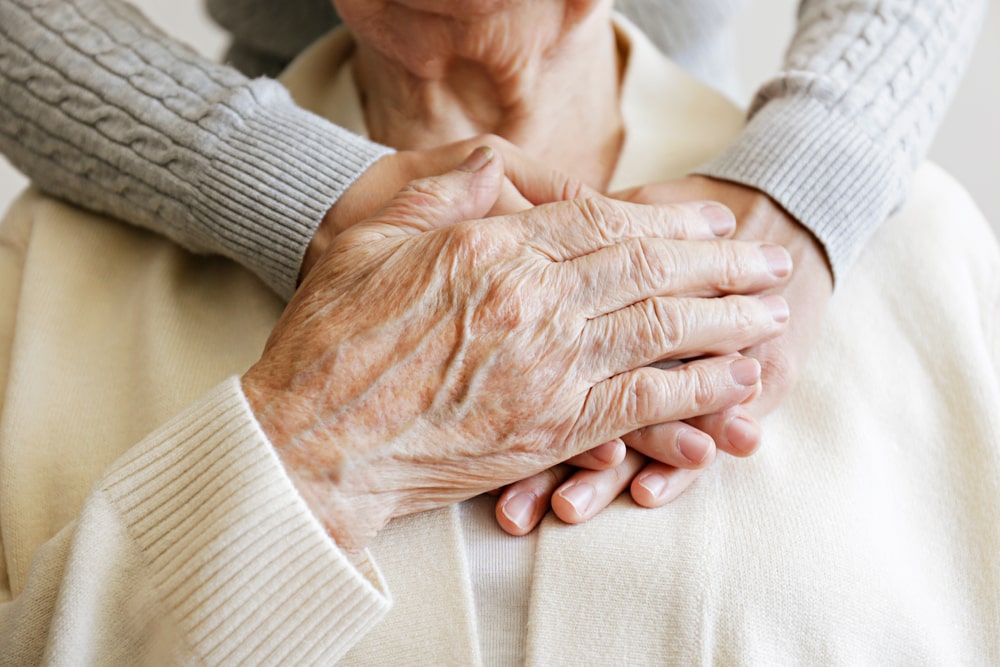You may have noticed that grief puts a lot of stress on your mind and body. To combat that stress, your body’s natural response is to release a hormone called cortisol. Cortisol helps regulate your blood pressure, blood sugar, inflammation levels, and stress response. So, it’s a good thing, but cortisol also makes you tired. That’s why it’s important to practice good self-care during times of grief, and one important key to self-care is exercise. The best news – according to the experts, as little as 30 minutes a day of moderate exercise can make a difference.

It might seem counterintuitive to exercise when you’re already feeling tired and emotionally spent, but let’s discuss 5 ways that exercise can make you feel better when you’re feeling down.
1. Exercise Boosts Mood
When you exercise, your body releases endorphins, a hormone that acts as a natural pain and stress reliever. You can decrease your stress and anxiety by exercising just a little bit every day. That might mean a brisk walk outside for 30 minutes or a calming Pilates routine. As you work movement into your day, you will see your aches and pains ease and your mood boost. Numerous research studies have shown that inactivity and staying in bed increase anxiety and sad feelings, so get up and get moving.
2. Exercise Aids Sleep
Every person responds to grief differently, and for some, that includes experiencing sleeplessness. Your thoughts may be racing. You may be struggling to mentally accept what has happened. By including exercise in your daily routine, you can reduce your stress levels and make it more likely that you will relax when bedtime comes around. For more sleeping tips, make sure to read Sleeping Tips for the Grieving.
3. Exercise Provides an Emotional Reprieve
When a death occurs, it can quickly take center stage in your life. While you shouldn’t ignore your grief feelings, you can’t work through everything at once. Instead, give yourself mental and emotional breaks. Though it may only be for 20 or 30 minutes, participating in exercise allows your emotions to rest and gives your mind a much-needed reprieve.
4. Exercise Increases Self-Esteem & Normalcy
Grief and loss interrupt the normal flow of life. In many ways, grief can make you feel helpless and like you are no longer the captain of your own life. But by committing to regular exercise, you can begin to take back some of that control and normalcy. Whether it’s going for a run, attending a Zumba class, or playing golf, exercise can boost your self-esteem as you grow stronger and give you confidence to overcome any challenges and obstacles ahead.
5. Exercise Decreases Loneliness
The grief journey can feel long and lonely, but with exercise, you can increase your opportunities to give and receive support from others. Some days, it’s going to be easier to exercise at home or take a quick stroll around the block. However, when you can, try to attend a group class or invite a friend to walk with you. You will feel less lonely and will even have the chance to share what’s on your heart and mind.
Recommendations for Exercising While You’re Grieving
Now that you understand the benefits of exercise during times of grief, let’s talk through a few quick recommendations if you choose to add exercise to your grief journey.
Take it Easy on Yourself
Exercise isn’t going to magically cure your problems. And while exercise is a useful tool to boost your mood and create a better overall outlook, you also need to listen to your body. For a time, you may need to re-define what exercise looks like for you. You may be used to 45-minute HIIT sessions every day, but while you’re grieving, that may need to scale back to HIIT two days a week and long walks on the other days. The bottom line is, take it easy. Listen to your body. Don’t overdo it.
Eat Well and Drink Plenty of Water
After a death, many people experience a change in eating habits. Some may experience a loss of appetite, while others may overindulge in takeout, sweets, and comfort food. A few days of this is totally normal, but don’t let it go on too long. Instead, make an effort to give your body nutritious foods that will fuel you rather than drag you down. Also, drink plenty of water. Whether you are losing water through sweat (from exercise) or crying (from your feelings of grief), your body needs water to replenish itself. And to be on the safe side, limit your caffeine and alcohol as these two drink choices may dehydrate your body.
30 Minutes Can Make a Difference
Depending on your personality and preferred workout routine, 30 minutes may seem like forever or no time at all. But regardless of where you fall on the exercise spectrum, you will experience the benefits of exercise in as little as 30 minutes 5 days a week. So, if you aren’t ready to jump back into a full routine, that’s okay. Commit to 30 minutes of moderate exercise and see how you feel. Also, choose an activity that matches your mood. If you need peace and relaxation, do yoga or Pilates. If you’re dealing with anger, a boxing class might be best. No matter what you choose, even a little bit of exercise can help.
Lacking Motivation?
If you find that you just don’t have the desire to exercise but you’d like to, consider exercising to honor your loved one’s memory. You could sign up for a 5K or do a walking challenge. If your loved one enjoyed baseball, surfing, or some other sport, join a league and learn for yourself. You can also recruit friends or family to join you in your exercise goals. You’re more likely to do something if other people are counting on you to be there.
Don’t Use Exercise to Avoid Your Grief
It’s a natural part of human nature to avoid painful or difficult things. But, if you’re going to heal and learn how to move forward after a loss, it’s essential that you engage with your feelings and come to a place of reconciliation and peace. People all over the world use exercise to provide relief, a sense of purpose, and an outlet for positive or negative emotions. Carefully analyze your own motivations and make sure you aren’t using exercise as an excuse to escape your grief.
While including an exercise routine in your grief journey isn’t required to come to a place of healing, it is a useful tool in your belt. Exercise can boost your mood, help you sleep, provide a reprieve from complex feelings, increase your self-esteem, and decrease your loneliness during times of grief. And if you feel stuck despite doing your best to work through your feelings of grief, consider talking with a grief therapist. They can listen to what’s going on in your heart and mind and give you suggestions that will help you find the healing you’re looking for.









